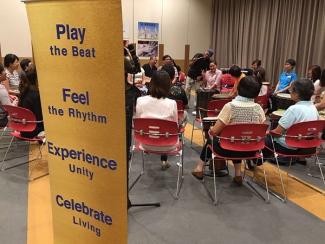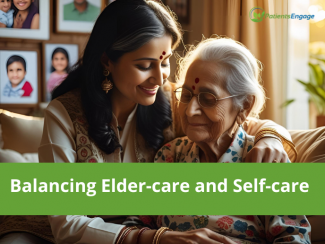
The Rhythm Wellness initiative of Global ArtsCare in Singapore conducts group drumming session for the elderly to reduce loneliness, increase energy levels and morale and provide recreational and wellness activities.
Tell us about Global ArtsCare and the work it does?
At GlobalArtsCare we aim to transform lives-in-care through creative arts engagement. Our activities aim to make creative arts engagement accessible to as many people in care facilities. In the process, residents, care-givers, and clients can reap the positive benefits of artistic expression and creative engagement.
Our program ‘Rhythm Wellness’, a prescription to wellness, addresses isolation and anxiety and encourages people to live a life well lived. The Rhythm Wellness initiative incubated under the umbrella of OneHeartBeat Percussions have made it possible for group drumming to be more accepted and integrated into care facilities, creative engagement programmes.
OneHeartBeat Percussions comprises of a team of trained facilitators and passionate performers, who have been actively using rhythm-centric activities as tools to create happy occasions and to bring people together at various levels. Through the medium of percussions music, they provide recreational and wellness activities for senior centres.
How do drums help contribute to health of the elderly (moods, neuromuscular, etc)?
Older people desire to find meaning as individuals, feel in control, be independent and have a sense of purpose. They are happy to receive affirmation through positive social relationship that provides them respect and status with opportunities for small success. Through Group Drumming, we encourage older people realize their potential and thereby enhance their well-being, physical and mental health. It provides opportunities to older people to realise their abilities that will help them be active and enable them to age with dignity and maintain their independence longer.
Benefits of Seniors Drumming:
- Decreased loneliness, depression and isolation
- Increased energy levels and morale
- Improved joint mobility and posture
- Help with motor skills
- Improvement in language ability
- Positive mental health
- Improved immunity
- Opportunities for fun and entertainment
- Making new social connections
- Stress relief
Can someone with arthritis, Parkinson’s, dementia, stroke or wheelchair user participate in the drumming sessions?
Yes. They play drums while sitting. So people in wheelchairs can participate as well. So too can people with dementia and arthritis. The shoulder and wrist movement while playing the drums reduces stiffness, improves circulation and provides some very good exercise. Through providing opportunities for small successes we aim to share and encourage individuals to assume responsibility for "whole person approach" of feeling good. So people with all kinds of debilities and difficulties can join in, create their own music, have fun and feel good.
What are the challenges and how do you help address them?
We allow engagement in an interactive and recreational manner with careful facilitation that is accepted as meaningful and provides vital ways to feel good. We put our senior clients at absolute ease by generously supporting them to explore and discover.
I am sure people say "I have no rhythm, I have never played an instrument before". Can such people participate? Any examples, incidents?
It is essential for the Artist-Facilitators to understand and be sensitive to the backgrounds, abilities, experiences and capacities of their clients. To be able to effectively influence and encourage clients to be creative through activities designed for them, to experience small successes and discoveries from themselves and peers is a motivation to I Can PLAY!!!!!!
Our Artist-Facilitators keenly observe small successes of our clients, so that they can create opportunities for creativity through appropriate learning activities. It is important for Artist-Facilitators to be understanding and sensitive and not to underestimate or over guide the clients.
What are the popular rhythms and beats amongst the elderly?
Some of them have heard some rhythm in the past and wish to play it. Others pick up what is being taught at the centre. But they all feel proud and happy about their contribution or music being accepted by the community.
Tell us about some of the more interesting anecdotes.
Rhythm is contagious and connects.
- There was a client wheeled on a stretcher will all tubes to the activity room. After about 10 minutes of hearing the drums, we realised he was moving his toes in rhythm.
- A client came on the wheelchair and after half-an-hour, he got up and began to “boogie”.
- Clients walk in weak and listless, and leave happy and energetic.
- Clients rushing back after a medical check-up to attend the Group Drumming activity.
What does it take to start a drumming circle in the community?
- Encourage individuals from the organization to accept that engaging in interactive/ recreational/ facilitated Group Drumming is beneficial to lead and maintain good health.
- In a population which is diverse in culture, ethnicity, language and tradition our city-state encouragement is an on-going process to accept that individual well-being is a collective responsibility.
Here is a beautiful extract from a poem that aptly summarizes our activity and aim.
“It’s time to stop thinking of the drum as just a musical instrument.
Start thinking of it as a -
-
unifying tool for every family,
-
a recreation tool for every community,
-
a wellness tool for every retiree,
-
and an educational tool for every classroom.”
–Remo Belli, Founder and CEO of Remo, Inc.
If you liked this you will like Never Too Old To Sing - a community music initiative for the elderly






